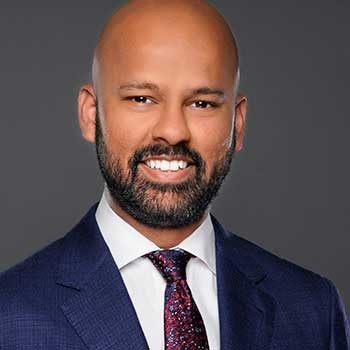
A relentless focus on improving public service means that Ryan Rajkumarsingh FCCA was actually more prepared for the global Covid-19 pandemic than even he expected.
As the director of the Department of Commerce and Investment (DCI) for the Cayman Islands government, Rajkumarsingh leads the team responsible for licensing and regulation of all non-financial businesses registered and operating in this tropical British Overseas Territory, which sits 400km south of Cuba.
‘At the start of my career, computers in accounting were the new thing,’ Rajkumarsingh says. ‘I got to see two worlds. I did the paper accounting with actual ledgers, where we had to write numbers by hand, but I also saw the introduction of computers in accounting and recognised the immediate benefits they brought.’
Witnessing both sides of that technological transformation taught Rajkumarsingh the importance of continual innovation, where even relatively minor tweaks can manifest into larger efficiencies and improved outcomes.
‘The pandemic really made us appreciate what technology could do for us to improve our efficiency’
Basics
13,266
Number of business licences the Cayman Islands’ Department of Commerce and Investment (DCI) issued in the first 10 months of 2020 – topping the 12,487 licences issued in the whole of 2019.
1,668
Number of inspections carried out in the first 10 months of 2020.
24
Number of staff, representing six nationalities.
64,958
Population of the Cayman Islands (2019)
For example, when Rajkumarsingh joined DCI in 2010, he immediately implemented the use of electronic signatures and business licence issue via email. While he concedes that they may seem like pedestrian changes on the surface, with ‘just those simple two things, we improved efficiency by 50%’.
That was just the start. Since becoming director in 2013, Rajkumarsingh has led the department through a series of major changes, quadrupling the number of staff and taking on new regulatory functions, all the while seeking to improve processes and sustain staff morale.
Pandemic-ready
As a result, Rajkumarsingh’s department was largely unfazed by Covid-19, having transitioned much of its work online.
‘Because we were already functioning with our 24/7 online system, when the pandemic happened, there was not a big shift for us,’ he says. If anything, ‘the pandemic really made us appreciate what technology could do for us to improve our efficiency. We didn’t close down to the outside world. We just weren’t there in person.’
Having taken these steps meant that Rajkumarsingh could focus his energy on his top two priorities during 2020; first, protecting and promoting the health and safety of his team during lockdown; and, secondly, ensuring remote access to the department’s network from home.
Rajkumarsingh believes that the pandemic has not only illustrated the value of building resilient government departments, but also reinforced their responsibility to keep innovating. ‘What’s next for us in order to grow? How do we get better?’ he asks.
Born and raised in Trinidad and Tobago, Rajkumarsingh gained his ACCA Qualification in 1996. After qualifying, he worked for several years as an auditor in both the private and public sector in Trinidad, but it wasn’t until he joined the Cayman Islands government in 2003 that Rajkumarsingh began to realise how much a career in public service offered.
He first joined the government’s audit unit as a senior internal auditor, giving him a crash course on the inner workings of the Caymanian government. In 2006, he moved on to the customs department, where he worked as the finance manager.
In 2010 he made the jump to DCI as the head of business licensing and enforcement, describing it as ‘an opportunity to do something brand new with my career.’ Rajkumarsingh was then promoted to the department’s most senior position in 2013.
The DCI is responsible for issuing business licences and enforcing regulatory compliance for all non-financial businesses operating in the Cayman Islands, with the exception of lawyers and doctors.
In 2018, the DCI’s remit was expanded to include anti-money laundering supervisor for real estate agents and dealers in precious metals and stones. In addition to its regulatory role, the department also provides strategic policy advice and feedback to senior government leaders. All businesses are required to apply for a business licence annually.
CV
2013
Director, Department of Commerce and Investment, Cayman Islands government
2010
Head of business licensing and enforcement, Department of Commerce and Investment, Cayman Islands government
2006
Finance manager, HM Customs, Cayman Islands government
2003
Senior internal auditor, internal audit unit, Cayman Islands government

Special Economic Zone support
While the DCI is not involved in financial services regulation – which is the purview of the Cayman Islands Monetary Authority – Rajkumarsingh notes that it does have an important role in licensing and regulating non-Caymanian businesses that want to establish a presence in the Cayman Islands’ Special Economic Zone.
Prohibited from competing with local companies, offshore individuals seeking to set up a business in the Cayman Islands must first meet with the zone developer, Cayman Enterprise City, to ensure that their proposed business is eligible.
If pre-approved, the applicant must then use the services of a local management company, regulated by the Cayman Islands Monetary Authority, to set up the business. It is only at that stage that an applicant is allowed to file a business licence application with the DCI.
Rajkumarsingh is quick to stress the rigour of DCI’s background checks, which include running all applications through several global databases to flag any aberrations. The applications are then adjudicated by the Special Economic Zone Authority, an arm’s length tribunal that delivers a final decision.
Gold standard
At present, Rajkumarsingh is considering what the future of business licensing will look like and seeking to proactively adapt to future trends.
‘Our forms and documentation should be so straightforward and simplified that we should eliminate any kind of bureaucracy from it,’ he says.
Rajkumarsingh’s leadership has also not gone unnoticed, with the department winning several awards in recent years, including the prestigious Investors in People Gold certification for 2019-2022, and being named one of the Best Places to Work in the Cayman Islands in 2018/19. Rajkumarsigh himself was award a certificate and badge of honour by the Cayman Islands governor for his achievements in leadership and innovation in the DCI last year during the pandemic.
Nearly 25 years after earning his ACCA Qualification, Rajkumarsingh is still effusive about the value of that crucial first step. ‘I know it helped me a lot with career growth,’ he says. This is borne out by the fact that he now spends part of his time teaching the next generation of ACCA accountants.
‘I believe that ACCA prepared me for this career. In fact, it set the tone for my career,’ he says. ‘ACCA really set the foundation for me, in everything I’ve done in my whole career.’
Tips
‘Really spend time with your people. Understand what they do. Understand what they are about. Understand what motivates them. Because if they feel valued, you are limitless in terms of what you can accomplish.’
‘Jump. The universe is waiting for you. Take the leap. That’s the only way you will progress. That’s the only way I did.’
‘Working in government, I feel I can make the biggest difference. I can see where I’ve impacted policy, where I’ve impacted changes.’
‘Use ACCA as a stepping stone for other careers that you could go into.’
‘Maintain a healthy work/life balance; it prevents burnout and increases productivity at home and in the office.’




